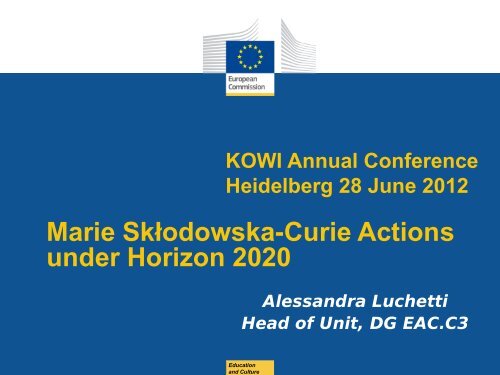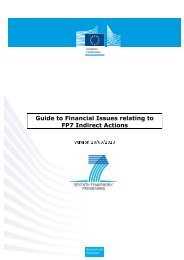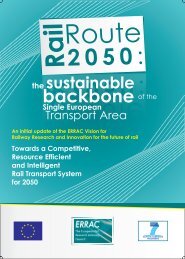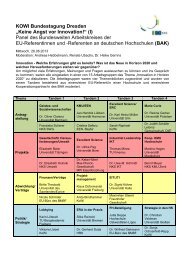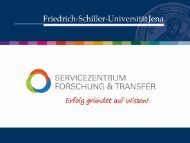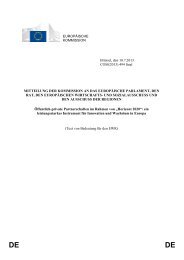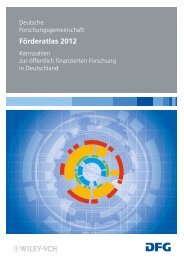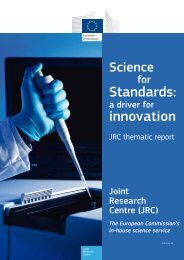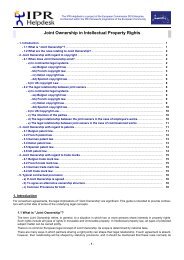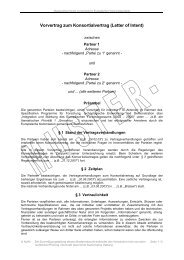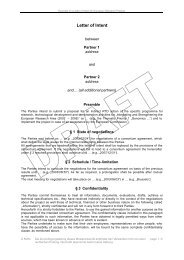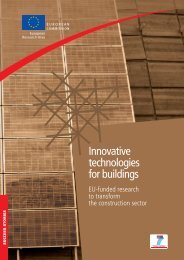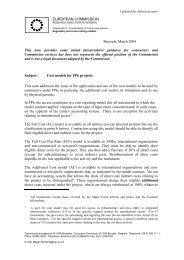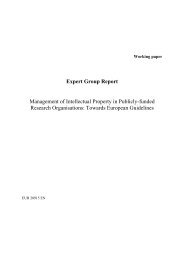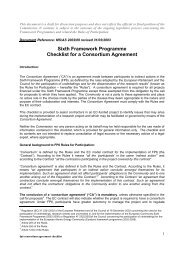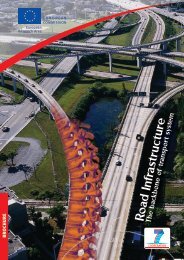Marie Skłodowska-Curie Actions under Horizon 2020 - KoWi
Marie Skłodowska-Curie Actions under Horizon 2020 - KoWi
Marie Skłodowska-Curie Actions under Horizon 2020 - KoWi
Create successful ePaper yourself
Turn your PDF publications into a flip-book with our unique Google optimized e-Paper software.
KOWI Annual Conference<br />
Heidelberg 28 June 2012<br />
<strong>Marie</strong> <strong>Skłodowska</strong>-<strong>Curie</strong> <strong>Actions</strong><br />
<strong>under</strong> <strong>Horizon</strong> <strong>2020</strong><br />
Alessandra Luchetti<br />
Head of Unit, DG EAC.C3<br />
Education<br />
and Culture<br />
Date: in 12 pts
Education<br />
and Culture<br />
Agenda<br />
<strong>Marie</strong> <strong>Curie</strong> achievements<br />
<strong>Horizon</strong> <strong>2020</strong><br />
<strong>Marie</strong> <strong>Skłodowska</strong>-<strong>Curie</strong> <strong>Actions</strong>:<br />
Objectives and rationale<br />
Feedback received<br />
Key features<br />
MSC <strong>Actions</strong> <strong>under</strong> H<strong>2020</strong><br />
Expected impact
Education<br />
and Culture<br />
<strong>Marie</strong> <strong>Curie</strong> <strong>Actions</strong><br />
Basics<br />
Pierre and <strong>Marie</strong> <strong>Curie</strong> honeymoon, 1895<br />
<br />
<br />
<br />
<br />
Significant EU fellowships programmes since<br />
1990 (FP3) for researchers’ mobility<br />
<strong>Marie</strong> <strong>Curie</strong> label since 1996 (~60.000 fellows to<br />
date)<br />
<strong>Actions</strong> aimed at structuring training, mobility<br />
and career development for researchers<br />
Under FP7, implemented through the People<br />
Programme (2007-2013)
Key features<br />
• Bottom-up approach<br />
• Mobility, both transnational and intersectoral<br />
• Main EU programme providing structured doctoral training,<br />
including industrial doctorates<br />
• Opening research careers at European and international level<br />
• Enhanced business-academia collaboration and staff exchange<br />
• Excellent employment and working conditions, in line with the EU<br />
Charter and Code for Researchers<br />
Education<br />
and Culture<br />
Date: in 12
FP7 MCA Achievements<br />
35000<br />
30000<br />
25000<br />
20000<br />
15000<br />
10000<br />
5000<br />
0<br />
1996-1998 1999-2002 2002-2006 2007-2010 2011-2013<br />
COFUND<br />
8%<br />
Economics 2%<br />
Mathematics<br />
3%<br />
Social Sciences<br />
and Humanities<br />
9%<br />
Chemistry<br />
10%<br />
1996-2010<br />
50 000 <strong>Marie</strong> <strong>Curie</strong> Researchers<br />
Life Sciences<br />
27%<br />
Environmental and<br />
Geo-sciences<br />
11%<br />
Physics<br />
13%<br />
Information Science<br />
and Engineering<br />
17%<br />
- 60 000 researchers financed since the<br />
creation of the <strong>Marie</strong> <strong>Curie</strong> <strong>Actions</strong><br />
- More than 10 000 PhD supported in FP7<br />
- <strong>Marie</strong> <strong>Curie</strong> researchers coming from all<br />
over the world (around 130 nationalities)<br />
- <strong>Marie</strong> <strong>Curie</strong> host organisations in more<br />
than 80 countries<br />
- 46% of researchers coming to EU from<br />
industrialised countries stay in Europe<br />
after the end of the IIF fellowship<br />
- 38% women participation in FP7 MCA,<br />
close to the 40% target<br />
Budget distribution by scientific panel<br />
in FP7 (bottom up approach)<br />
Education<br />
and Culture
Education<br />
and Culture<br />
FP7 MCA Achievements<br />
Ageing Population<br />
€36m; 2% Climate change<br />
€106m; 6%<br />
Energy shortage<br />
€177m; 9%<br />
- More than 50% of the budget<br />
dedicated to research on societal<br />
challenges<br />
Other<br />
€911m; 49%<br />
Food supply<br />
€77m; 4%<br />
- Bridging the academia-business gap:<br />
~6.000 secondments / recruitments in<br />
~350 FP7 MCA projects<br />
Water supply<br />
€32m; 2%<br />
Health<br />
€534m; 28%<br />
- SMEs play a major role: in IAPP and<br />
ITN they account for more than 50%<br />
of all businesses participating<br />
Budget dedicated to societal challenges <strong>under</strong><br />
FP7 MCA (2007-2011)
Education<br />
and Culture<br />
FP7 MC <strong>Actions</strong><br />
ITN (Initial Training Networks)<br />
including EID and IDP since 2012<br />
IEF<br />
(Intra-European Fellowships)<br />
IOF<br />
(International Outgoing Fellowships)<br />
IIF<br />
(International Incoming Fellowships)<br />
CIG<br />
(Career Integration Grants)<br />
IAPP<br />
(Industry-Academia Partnerships<br />
and Pathways)<br />
IRSES<br />
(International Research Staff<br />
Exchange Scheme)<br />
COFUND<br />
(Co-funding of regional, national,<br />
international programmes)<br />
Research networks supporting initial and doctoral training<br />
43% of FP7 MCA budget, 9-10% success rate<br />
Support for researchers moving inside Europe<br />
Support for researchers moving away from Europe<br />
Support for researchers moving to Europe<br />
Support for researchers starting a permanent position in Europe<br />
Industry-Academia cooperation through exchange of staff<br />
International cooperation between MS/AC & other third countries through<br />
exchange of staff<br />
Co-funding of regional, national and international research funding<br />
programmes for experienced researchers
<strong>Horizon</strong> <strong>2020</strong><br />
International cooperation<br />
Europe <strong>2020</strong> priorities<br />
European Research Area<br />
Shared objectives and principles<br />
Common rules, toolkit of funding schemes<br />
−<br />
−<br />
−<br />
−<br />
−<br />
−<br />
Societal Challenges<br />
Health, demographic change and wellbeing<br />
Food security, sustainable agriculture,<br />
marine and maritime research, and the<br />
bio-based economy<br />
Secure, clean and efficient energy<br />
Smart, green and integrated transport<br />
Climate action, resource efficiency and raw<br />
materials<br />
Inclusive, innovative and secure societies<br />
−<br />
−<br />
−<br />
Industrial Leadership<br />
Leadership in enabling and industrial<br />
technologies (ICT, nano, materials, bio,<br />
manufacturing, space)<br />
Access to risk finance<br />
Innovation in SMEs<br />
Simplified access<br />
Excellent Science<br />
− European Research Council<br />
− Future and Emerging Technologies<br />
− <strong>Marie</strong> <strong>Skłodowska</strong>-<strong>Curie</strong> actions on skills, training and<br />
career development<br />
− Research infrastructures<br />
Supporting the objectives:<br />
European Institute for Innovation and Technology<br />
Joint Research Centre<br />
Dissemination &<br />
knowledge transfer
Education<br />
and Culture<br />
MSCA Objectives<br />
• Main objective<br />
Ensure the optimum development and dynamic use of Europe’s<br />
intellectual capital in order to generate new skills and innovation<br />
• Rationale<br />
Encourage new, creative and innovative types of training<br />
Identify excellent talents in research and innovation in<br />
international competition<br />
Make best researchers in Europe and the world work together<br />
across countries, sectors and disciplines<br />
Create a whole new mind-set in Europe, crucial for creativity and<br />
innovation<br />
<strong>Marie</strong> <strong>Skłodowska</strong>-<strong>Curie</strong> <strong>Actions</strong> = excellent researchers’ training<br />
and mobility for career development
Education<br />
and Culture<br />
MSCA in H<strong>2020</strong><br />
Proposed Budget (2014-<strong>2020</strong>): € 5.75 billion<br />
<strong>Marie</strong> <strong>Curie</strong> <strong>Actions</strong> - budget evolution<br />
7000<br />
6000<br />
5000<br />
€ Million<br />
4000<br />
3000<br />
2000<br />
1000<br />
0<br />
1994-1998 1998-2002 2002-2006 2007-2013 2014-<strong>2020</strong><br />
FP4 FP5 FP6 FP7 H<strong>2020</strong><br />
Framework Programme<br />
~7% of H<strong>2020</strong> budget
Education<br />
and Culture<br />
Stakeholder feedback<br />
Top 5 most frequent comments on MCAs:<br />
1. One of the most successful<br />
programmes; call for an increase of<br />
the budget allocated<br />
2. Knowledge triangle to be reinforced<br />
3. Importance of mobility<br />
'The <strong>Marie</strong> <strong>Curie</strong> scheme is one of the most<br />
efficient programmes, both in terms of support<br />
from the scientific community and of outcome in<br />
reinforcing the quality and excellence of scientific<br />
staff. Compared to many other programmes in<br />
H<strong>2020</strong>, it has a long and proven track record.'<br />
(LERU)<br />
‘The <strong>Marie</strong> <strong>Curie</strong> scheme has been particularly<br />
successful in encouraging the mobility of<br />
researchers across the European Research Area,<br />
and providing valuable research training for the<br />
predominantly young researchers who form the<br />
future of the EU's science base.'<br />
(UK Higher Education Sector)<br />
4. Bottom-up approach<br />
5. Streamlining<br />
‘The MCA research training and mobility<br />
programme is one of the clear success stories of<br />
the previous Framework Programmes. It has<br />
effectively reached out to and gained<br />
respectability amongst the research community.'<br />
(VRWI)
Education<br />
and Culture<br />
MSCA – Key Features<br />
• Bottom-up approach remains<br />
• Fostering key skills and competences for research and innovation<br />
• Main EU programme providing structured doctoral training, including industrial<br />
doctorates<br />
• Mobility, both trans-national and inter-sectoral<br />
Opening research careers at European and international level<br />
Enhanced business-academia collaboration and staff exchange<br />
• Excellent employment and working conditions, in line with the EU Charter and<br />
Code for Researchers<br />
• Role model with pronounced structuring effect on regional, national and other<br />
international programmes
Education<br />
and Culture<br />
MSCA – Key Features<br />
• Cross-cutting issues<br />
Gender balance<br />
Strengthening the participation of SMEs<br />
Synergies with the societal challenges and the industrial technologies<br />
• Broad participation of businesses and other socio-economic actors<br />
• Increased possibility of the portability of grants<br />
• Stronger emphasis on communicating results and on outreach activities<br />
• Extended use of the scale of unit costs (including indirect costs)
Education<br />
and Culture<br />
MSC <strong>Actions</strong><br />
ITN<br />
(including EID and IDP)<br />
IEF<br />
IOF<br />
IIF<br />
CIG<br />
IAPP<br />
IRSES<br />
COFUND<br />
Action 1<br />
Early-stage<br />
Researchers<br />
Action 2<br />
Experienced<br />
Researchers<br />
Action 3<br />
Exchange of<br />
Staff<br />
Action 4<br />
COFUND<br />
Doctoral and initial training of researchers<br />
proposed by international networks of<br />
organisations from public and private<br />
sectors<br />
Individual fellowships for most<br />
promising experienced researchers to<br />
develop their skills through<br />
international or inter-sector mobility<br />
International and inter-sector<br />
cooperation through the exchange of<br />
research and innovation staff<br />
Co-funding of regional, national and<br />
international programmes covering<br />
actions 1 & 2
MSCA – Doctorate level<br />
<br />
<br />
<br />
<br />
<br />
<br />
<br />
Based on FP7 ITNs best practice<br />
Structured doctoral training, including industrial and<br />
joint doctorates<br />
Combining scientific excellence with business<br />
innovation<br />
Aiming to develop research competences<br />
Equip PhD holders with skills matching public and<br />
private sector needs<br />
Addressing triple 'i' dimension of mobility<br />
Joint research training programmes with<br />
transferable skills modules and exposure to other<br />
sectors and disciplines<br />
Education<br />
and Culture
Education<br />
and Culture<br />
MSCA – Post-doc level<br />
<br />
<br />
<br />
<br />
Individual Fellowships to promote<br />
international and inter-sector mobility<br />
Aiming to support attractive career<br />
opportunities and facilitate career moves,<br />
also between public and private sectors<br />
Enhance competences and creative<br />
potential of best researchers, European and<br />
non-European willing to work in the EU<br />
In-built possibility of outgoing phase in TC<br />
or in private sector
Education<br />
and Culture<br />
MSCA – Exchanges<br />
<br />
<br />
<br />
<br />
New type of exchange of staff action to stimulate transfer of<br />
knowledge<br />
Flexible exchanges of highly skilled research and innovation staff<br />
Aiming to enhance cross-border and cross-sector collaboration<br />
Exchanges within Europe (cross-sector) and with third countries
Education<br />
and Culture<br />
MSCA - COFUND<br />
<br />
<br />
<br />
<br />
Stimulating regional, national and international programmes<br />
to foster excellence<br />
Spreading best practices of MSCA in terms of international<br />
mobility, research training, career development<br />
Increasing numerical and structural impact of MSCA<br />
Building on experience from FP7 COFUND – evaluation<br />
results available:<br />
• Both (IxF and COFUND) mechanisms are achieving their objectives and<br />
are strengthening the research capacity of the EU<br />
• COFUND is enhancing the international dimension of a number of national<br />
and regionally-based fellowship programmes in ways that are not open to<br />
Individual Fellowships<br />
• Modest positive impact on operational and administrative procedures of<br />
host institutions (COFUND)<br />
• Contributing to a gradual ‘levelling up’ in employment conditions for<br />
researchers
Education<br />
and Culture<br />
MSCA - Expected Impact<br />
2014-<strong>2020</strong><br />
• ~ 65.000 researchers to be supported, including 25.000 PhD candidates<br />
• ~ 200.000 scientific publications in high impact peer-reviewed journals<br />
• ~ 1.500 patent applications<br />
• ~ 100 spin-offs created<br />
• ~ 350-400 new regional / national / international programmes to be<br />
created targeting international and intersectoral training, and career<br />
development of research and innovation staff
Education<br />
and Culture<br />
Position of the Council<br />
and the Parliament<br />
Council Partial General Approach on H<strong>2020</strong> Regulation:<br />
MSCA:<br />
Initial position, subject to future discussions on budget<br />
Impact across the programme on the innovativeness of the private sector<br />
Mobility for European brain gain – importance of (re)integration<br />
Extension of co-funding, involve private sector<br />
Synergies with Erasmus for All, Structural Funds, KICs<br />
EP draft reports on the H<strong>2020</strong> package:<br />
MSCA:<br />
Budget share of 9.1% of <strong>Horizon</strong> <strong>2020</strong>, compared to 7.4% in the proposal of the Commission<br />
Specific measures to remove obstacles to the mobility of female researchers<br />
Joint or multiple doctoral degrees added as examples of innovative research training<br />
Support for outgoing mobility followed by return to Europe<br />
"Seal of excellence" on positively evaluated projects (not funded)
Education<br />
and Culture<br />
<strong>Marie</strong> <strong>Curie</strong> <strong>Actions</strong> Website<br />
http://ec.europa.eu/mariecurieactions<br />
<strong>Horizon</strong> <strong>2020</strong><br />
http://ec.europa.eu/research/horizon<strong>2020</strong>
Education<br />
and Culture<br />
Thank you for your attention<br />
alessandra.luchetti@ec.europa.eu


